Known for his unrivaled strength, Samson's secret lies in his long hair, but a betrayal changes everything—discover his story.
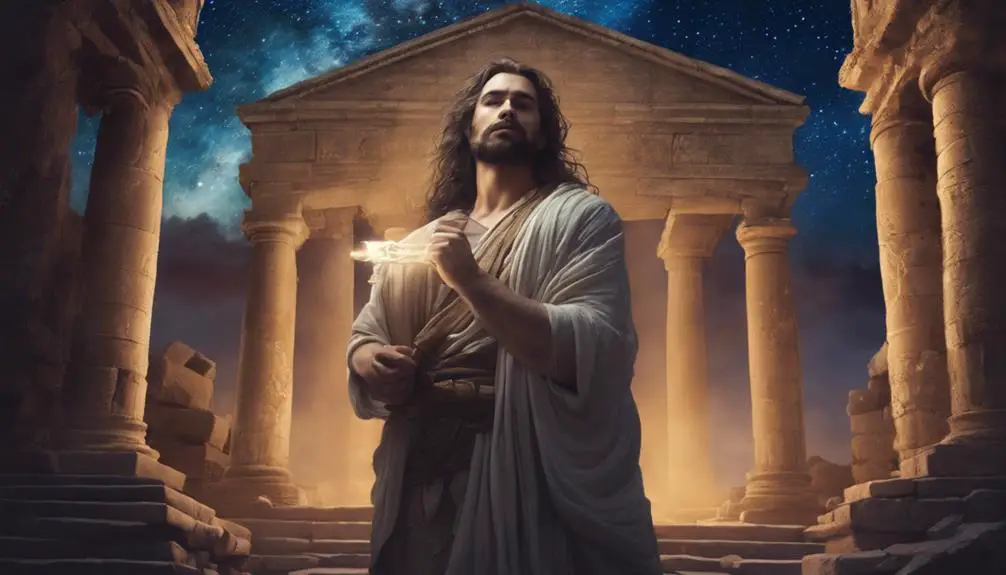
The Guy in the Bible With Long Hair
In a world where strength often comes from the might of one's arm or the sharpness of a sword, Samson's power rested on something as seemingly delicate as hair. You might wonder how strands of hair could be the cornerstone of such immense strength and the pivotal point of a man's downfall.
This story, more than a mere tale of physical might, touches on themes of faith, betrayal, and redemption. As you explore the life of Samson, you'll find yourself questioning the true source of strength and how our greatest weaknesses are often intertwined with our most notable assets.
Why did Samson place his trust in Delilah, and what can we learn from his story today? The answers might surprise you.
Key Takeaways
- Samson's uncut hair was a symbol of his Nazirite vow and divine strength.
- His long hair and power are central to his narrative of triumph and downfall.
- Delilah's betrayal led to Samson losing his hair and strength, highlighting vulnerability.
- Samson's story explores strength, faith, and redemption, resonating across cultures and ages.
Samson's Birth and Vow
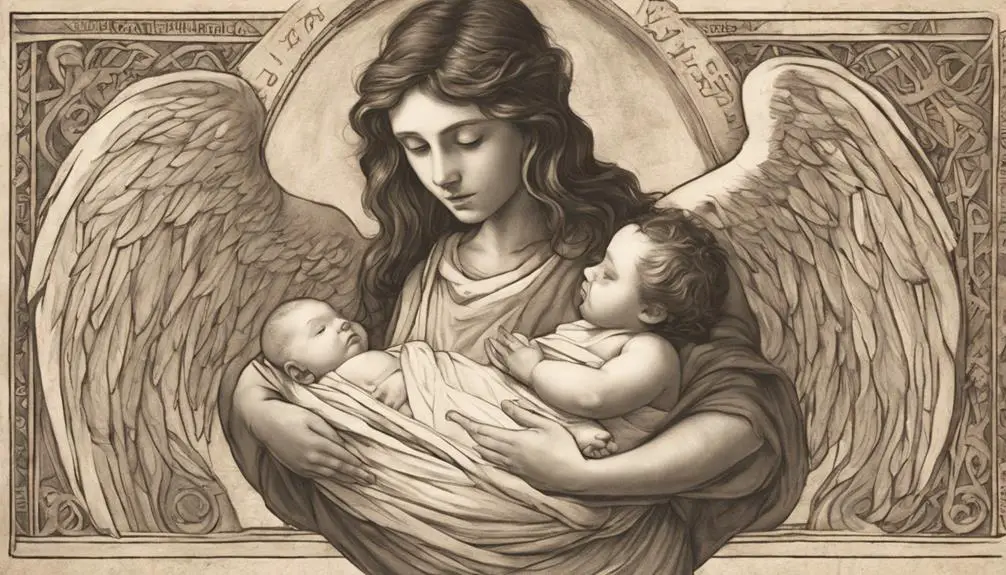
Samson's story begins notably with his birth, foretold to his previously barren mother by an angel who declared that he must be a Nazirite from birth, never cutting his hair as a sign of his vow to God. This miraculous birth sets the stage for his future endeavors and highlights the divine intervention in his life. The concept of a Nazirite, someone set apart for God's service, carries stringent restrictions, including abstaining from wine, avoiding contact with the dead, and, most famously in Samson's case, not cutting one's hair. These stipulations aren't merely arbitrary rules but are imbued with significant religious and cultural implications, emphasizing purity, dedication, and a physical manifestation of one's commitment to God.
Analyzing Samson's Nazirite vow in the context of his miraculous birth offers a deeper understanding of his character and destiny. It suggests that his strength isn't just a physical attribute but is deeply rooted in his spiritual and religious dedication. The narrative implies that Samson's power and his downfall are inextricably linked to his adherence to, and eventual deviation from, these Nazirite restrictions. This duality showcases the complexity of divine favor and the consequences of personal choices within biblical narratives.
The Secret of His Strength
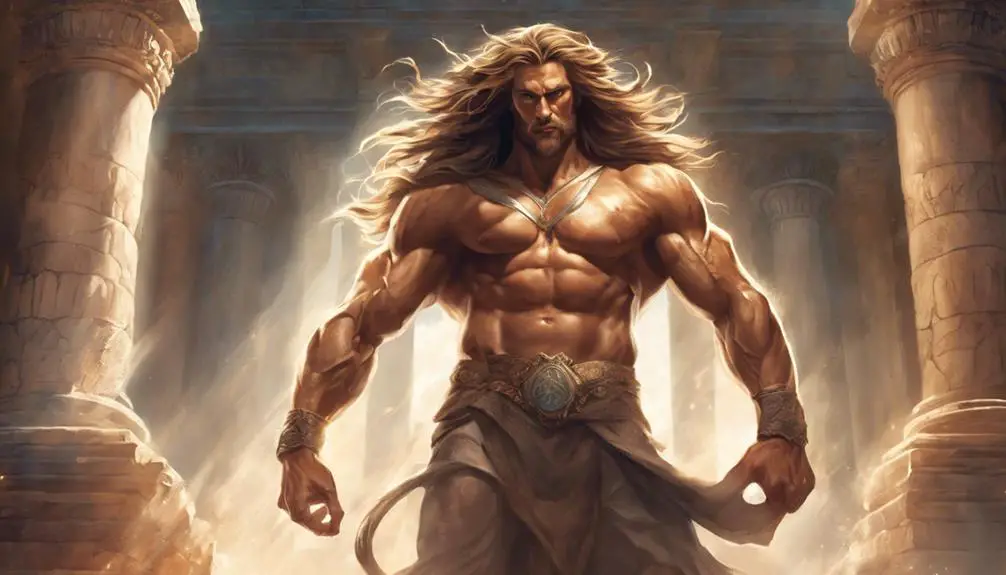
Understanding the origins of Samson's unparalleled strength requires examining not just his physical prowess but also the profound spiritual commitment symbolized by his uncut hair. This long hair wasn't merely a personal choice but a tangible sign of his Nazirite vow to God, reflecting an intrinsic link between his spiritual dedication and his legendary might. Hair symbolism, deeply rooted in cultural perceptions, plays a pivotal role in this narrative, serving as a bridge between the divine and the human, the spiritual and the physical.
Aspect |
Cultural Significance |
Relation to Samson |
|---|---|---|
Hair Symbolism |
Power and Strength |
Source of Might |
Spiritual Vow |
Divine Dedication |
Nazirite Commitment |
Cultural Views |
Honor vs. Shame |
Honor through Vow |
Divine Gift |
Godly Endowment |
Strength |
Human Weakness |
Faith vs. Folly |
Test of Character |
This table encapsulates the multifaceted relationship between Samson's hair and his strength, reflecting not just a personal journey but also the broader cultural perceptions of hair symbolism. His hair was more than a mere physical attribute; it was a covenant with God that granted him extraordinary power, making it a key to understanding his strength and the spiritual and cultural dimensions that frame this story.
Samson's Triumphs and Challenges
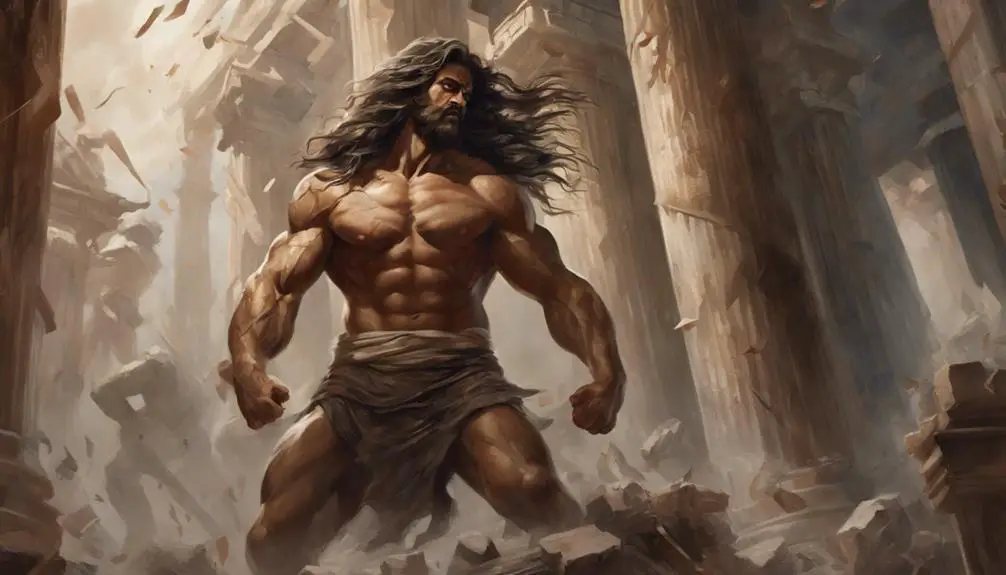
Exploring the narrative of Samson, one finds a series of triumphs and challenges that reveal the complex interplay between divine destiny and human agency. His life, marked by extraordinary feats of strength, unfolds within the fraught context of Philistine interactions, highlighting not only his physical prowess but also the moral implications of his actions. Samson's triumphs, notably his victories over the Philistines, underscore a divine mandate to begin the deliverance of Israel. Yet, these triumphs aren't unalloyed; they're interspersed with personal challenges and moral failings that complicate his role as a judge and Nazirite.
His engagements with the Philistines often blur the lines between personal vendetta and divinely sanctioned mission, raising questions about the nature of justice and the ethical use of power. Samson's narrative is punctuated by acts that oscillate between valor and vengeance, illustrating the tension between divine purposes and human choices. This duality is central to understanding Samson's story, as it encapsulates the perennial struggle between fulfilling one's destiny and navigating the moral complexities inherent in human action.
The Betrayal by Delilah

Delilah's betrayal of Samson represents a pivotal moment in his narrative, revealing both the fragility of human trust and the profound impact of personal relationships on divine missions. Delilah's motives are complex, intertwining personal gain with the pressures exerted by Philistine rulers. This act of betrayal not only underscores the vulnerabilities inherent in human relationships but also highlights the tension between divine destiny and human agency.
Aspect |
Delilah's Role |
Impact on Samson |
|---|---|---|
Trust |
Breached through manipulation |
Led to physical and spiritual downfall |
Motives |
Driven by personal gain and external pressures |
Challenged Samson's judgment and loyalty |
Divine Mission |
Acted as an unwitting catalyst for destiny |
Forced a reckoning with divine purpose |
Relationship Dynamics |
Exposed the complexities of intimacy and betrayal |
Illustrated the power dynamics at play |
Analyzing Delilah's betrayal requires a deep dive into the nuances of their relationship dynamics. Her actions, while personally motivated, serve as a crucial turning point, forcing Samson to confront the consequences of his choices and the realities of his divine mission. This episode not only serves as a cautionary tale about the dangers of misplaced trust but also as a reflection on the intricate dance between fate and free will.
The Fall of Samson
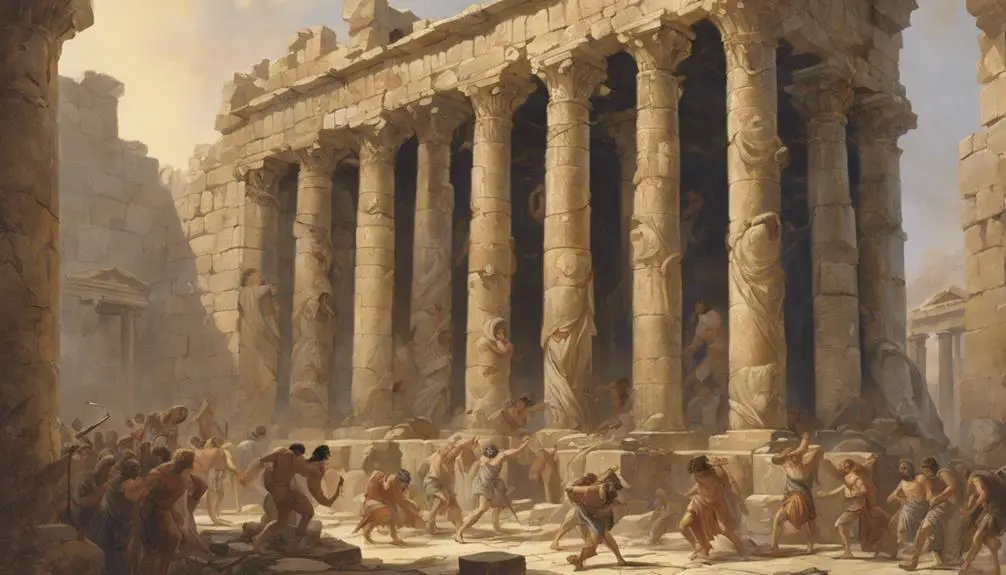
Following the betrayal by Delilah, Samson's downfall embodies the culmination of his struggles, showcasing the intricate interplay between human weakness and divine providence. His capture by the Philistines, driven by both personal betrayal and the machinations of Philistine politics, marks a pivotal moment in his narrative. The Philistines, leveraging their understanding of Samson's source of strength, not only subdue him but also seek to humiliate him, a reflection of the broader geopolitical tensions and personal vendettas prevalent within the ancient Near Eastern context.
Samson's final act, pulling down the pillars of the Philistine temple, resulting in his own death along with that of his captors, illuminates the complex relationship between divine will and human agency. This dramatic episode, set amidst the architectural ruins of a Philistine temple, serves as a potent symbol of the inevitable downfall of those who defy divine mandates, while simultaneously highlighting the paradox of Samson's strength and vulnerability.
This moment, deeply embedded within the socio-political and religious fabric of the time, offers a poignant commentary on the transient nature of power and the enduring impact of faith and fate. It underscores the nuanced dynamics of Philistine politics and the symbolic significance of architectural ruins, both of which are central to understanding Samson's legacy and the broader biblical narrative.
Legacy and Interpretations
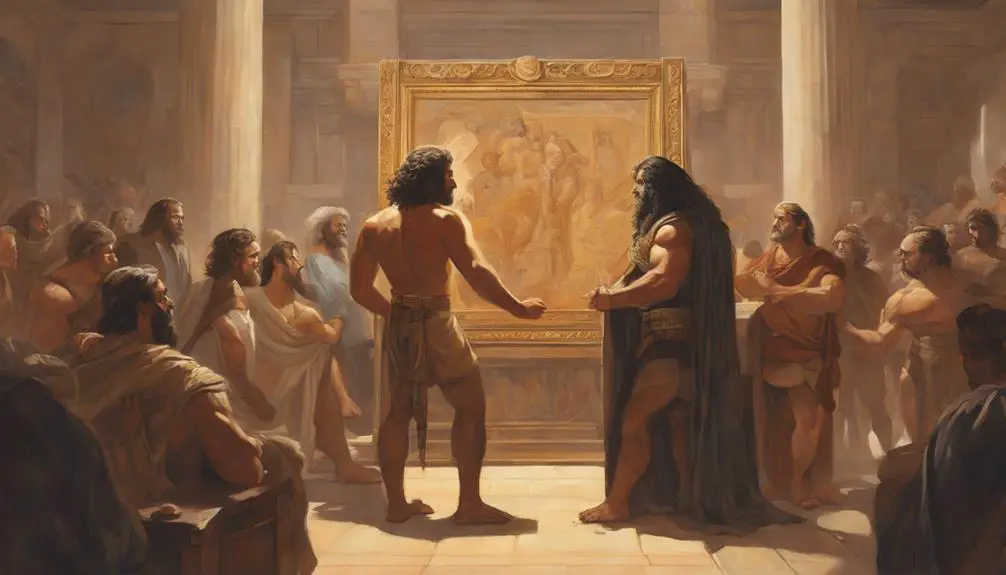
Over the centuries, Samson's story has been subject to diverse interpretations, reflecting its profound impact on cultural, religious, and philosophical thought. You've likely seen how this biblical figure, known for his Herculean strength derived from his uncut hair, has transcended the original narrative to embody various facets of cultural symbolism and inspire modern adaptations.
- Cultural Symbolism: Samson's long hair and immense strength have become symbols of divine covenant and human frailty, illustrating the paradox of power being both a gift and a potential downfall.
- Artistic Inspirations: Artists and writers have been captivated by Samson's saga, using it to explore themes of betrayal, redemption, and the complexities of human nature. His story has been reimagined in countless paintings, sculptures, and literary works.
- Modern Adaptations: In contemporary culture, Samson's narrative has been adapted into movies, operas, and plays, showcasing the story's enduring appeal and its ability to resonate with modern audiences.
- Philosophical Discussions: Philosophers have debated the moral and ethical implications of Samson's actions, using his story as a framework for discussing concepts of strength, vengeance, and the human condition.
Samson's legacy, rich in cultural symbolism and ripe for modern adaptations, continues to influence and provoke thought across various fields, demonstrating the timeless relevance of his story.
Frequently Asked Questions
How Has the Story of Samson Influenced Modern Literature and Popular Culture?
The story of Samson has significantly impacted modern literature and popular culture, embedding Samson's archetype of the flawed hero and Delilah's influence as the ultimate betrayer.
This narrative has inspired countless works, showcasing the complexity of strength and vulnerability, betrayal, and redemption. It serves as a foundational myth, influencing character development and plot dynamics across genres, from classic literature to contemporary movies, shaping our understanding of heroism and human fragility.
Are There Archaeological Findings or Historical Evidence That Support the Existence of Samson or the Events Described in His Story?
You're looking into whether there's solid proof of Samson's existence or the events in his tale. While there's no direct archaeological evidence confirming Samson's life or feats, insights into Philistine technology and diet during the era offer some context.
These findings don't directly validate his story but provide a backdrop for understanding the narrative's setting. Nonetheless, the absence of concrete evidence doesn't detract from the story's cultural or religious significance.
How Do Different Religious Traditions Outside of Christianity and Judaism Interpret the Story of Samson?
You're venturing into a realm where Samson's legacy transcends the boundaries of his origins, branching into diverse cultural interpretations.
This exploration reveals how his story, stripped of its initial religious context, becomes a universal allegory of strength, betrayal, and redemption.
Different traditions outside Christianity and Judaism analyze Samson's narrative through their own lenses, enriching his tale with varied meanings and insights, showcasing the power of mythology to cross cultural and religious divides.
What Psychological Analyses Have Scholars Conducted Regarding Samson's Behaviors and Decisions Throughout His Life?
You might find it fascinating that scholars have deeply analyzed the personality traits and leadership style exhibited throughout his life, setting aside his famous locks.
They've delved into his impulsive decisions and moments of profound strength, suggesting a complex interplay of psychological factors.
This scholarly work places his actions in a broader context, revealing how his unique characteristics influenced his leadership and the decisions he made, offering a nuanced understanding of his behavior.
How Has the Depiction of Samson's Physical Appearance Evolved in Art and Iconography Over the Centuries?
You've noticed that Samson's physical portrayal has shifted significantly through time, reflecting changes in hair symbolism and the variety of artistic mediums used.
Initially, his strength and divine connection were emphasized with flowing locks in sculptures and paintings, showcasing the power of his hair.
However, modern depictions often focus on realism and psychological depth, using hair to highlight his human vulnerabilities and complexities, diverging from earlier, more idealized representations.
Conclusion
In scrutinizing Samson's saga, you've witnessed the weaving of strength and susceptibility, triumph and tragedy. His hair, harboring heavenly power, highlights humanity's hybrid nature—both magnificent and malleable.
Delilah's duplicity doesn't solely signify Samson's downfall but delineates the delicate dance between destiny and discretion. This biblical behemoth's legacy, laden with lessons, lingers, inviting introspection into our own lives' labyrinthine layers.
Samson's story, steeped in symbolism, serves as a scholarly scaffold, supporting a deeper discourse on divinity, determination, and the dynamics of human desire.



Sign up